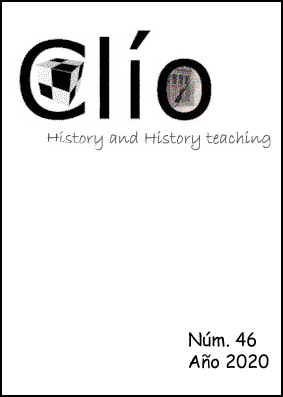Multiperspectivity as a way to teach the rise of Nazism in an exceptional context
DOI:
https://doi.org/10.26754/ojs_clio/clio.2020465264Keywords:
historical thinking, multiperspectivity, historical empathy, rise of nazism, second order, metaconceptual changeAbstract
Is it posible for students used to a paradigm of memory-history to the develop their historical thinking by learning about the rise of Nazism? Is this still possible telematically during a global pandemic? These questions were addressed by adopting an instruccional design based on disciplinary principles of multiperspectivy. Despite their meek results, they pose evidence supporting that students, when freed from the constrictions of their context, present a major capacity to modify their historical understanding.
Downloads
References
Ashby, R. y Lee, P. J. (1987). Children’s concepts of empathy and understanding in history. En C. Portal (Ed.), The history Curriculum for teachers (pp. 62-88). Falmer.
Barton, K. C. y Levstik, L. S. (2004). Teaching History for the common good. Lawrence Earlbaum Associates.
Barton, K. C. (2009). The denial of desire: how to make history education meaningless. En L. Symcox y A. Wilschut (Eds.), National History Standards: the problem of the canon and the future of teaching history (pp. 265-282). Information Age.
Barton, K. C. y MacCully, A. W. (2012). Trying to «See Things Differently»: Northern Ireland Students’ Struggle to Understand Alternative Historical Perspectives. Theory & Research in education, 40(4), 371-408.
Brooks, S. B. (2011). Hitorical Empathy as perspective recognition and care in one secondary social studies classroom. Theory & Research in education, 39(2), 166-202.
Chapman, A. (2011). Historical interpretations. En I. Davies (Ed.), Debates in history teaching. Routledge.
Doppen, F. H. (2000). Teaching and learning multiple perspectives. The social studies, 91(4), 159-169.
Endacott, J. L. y Brooks, S. (2018). Historical Empathy: perspectives and responding to the Past. En S. A. Metzger y L. M. Harris (Eds.), The Wiley International Handbook of History Teaching and Learning (pp. 203-225). John Wiley & Sons.
Evans, R. (2015). The third Reich in history and memory. Oxford University Press.
Fritzsche, (2012). Vida y Muerte en el Tercer Reich. Crítica.
Huijgen, T. y Holthuis, P. (2018). «Man, people in the past were indeed stupid», using a three-stage framework to promote historical contextualization. Teaching history, 172, 30-38.
Lee, P. (1998). «A lot of Guess work goes on» Children’s understanding of historical accounts. Teaching History, 92, 29-35.
Levesque, S. (2008). Thinking Historically. Educating Students for the 21th Century. University of Toronto Press.
Levstik, L. S. (1997). «Any History is someone’s history»: Listening to multiple voices from the past. Social Studies, 61(1), 48-51.
Levstik, L. S. y Barton, K. C. (1996). «They Still Use Some of Their Past»: Historical Saliences in Children’s Chronological Thinking. Journal of Curriculum Studies, 28, 531-576.
Rodríguez-Moneo, M. y López, C. (2017). Concept Acquisition and Conceptual Change in History. En M. Carrero et al. (Eds.), Palgrave Handbook of Research in Historical Culture and Education (pp. 469-490). Palgrave.
VanSledright, B. A. (2011). The Challenge of Rethinking History Education. Routledge.
Wineburg, S. (2001). Historical thinking and other unnatural acts. Charting the Future of Teaching the Past. Temple University Press.
Downloads
Published
Issue
Section
License
Copyright (c) 2020 Alberto Santos Cancelas

This work is licensed under a Creative Commons Attribution-NonCommercial-ShareAlike 4.0 International License.
This work is licensed under a Creative Commons Attribution-NonCommercial-ShareAlike 4.0 International License.
Copyright remains the property of authors. Permission to reprint must be obtained from the authors and the contents of JoS cannot be copied for commercial purposes. JoS does, however, reserve the right to future reproduction of articles in hard copy, portable document format (.pdf), or HTML editions of JoS.






